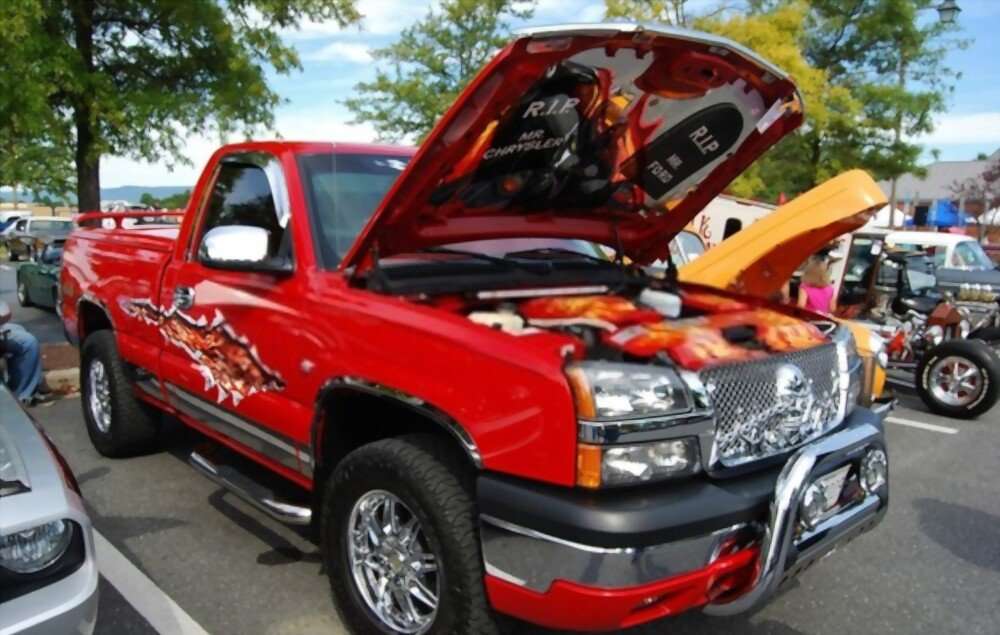It’s that time of year again when you take your vehicle in for the summer check-up. You’ve been noticing a strange noise every time you accelerate and you’re not quite sure what it is. You’re not alone.
Many drivers have been reporting their Chevy Silverado chirping noise when accelerating. But, you can’t help but feel a little concerned. So, what causes this chirping noise, and is it something to worry about?
In this post, we’ll explore what might be causing the problem and how to fix it. So if you’re wondering what to do about that pesky chirping sound, keep reading.
Jump to
- 1 What causes Chevy Silverado Chirping Noise When Accelerating?
- 1.1 Is it dangerous to drive with a chirping noise?
- 1.2 How to fix the chirping noise in Chevy Silverado?
- 1.2.1 1. Replace serpentine belt:
- 1.2.2 2. Replace timing belt, spark plugs, and brakes:
- 1.2.3 5. Tighten exhaust:
- 1.2.4 6. Repair engine:
- 1.2.5 7. Replace tires:
- 1.2.6 8. Adjust your engine’s idle speed:
- 1.2.7 9. Check for engine vacuum leaks:
- 1.2.8 10. Replace the catalytic converter:
- 1.2.9 FAQ’s
- 1.2.10 1. What causes a chirping noise while driving?
- 1.2.11 2. Why do I hear a chirping sound when I accelerate?
- 1.3 Conclusion:
Are there any consequences of ignoring a chirping noise?
Yes, if you’re hearing a chirping noise every time you accelerate, it’s important to get it checked out as soon as possible. Ignoring the problem could lead to more serious issues down the road.
- For example, if the noise is coming from your engine, it could be an Ignition Coil going bad. This is a serious issue that can damage your engine and lead to costly repairs.
- Another possible consequence of ignoring a chirping noise is that it could be a sign of a failing catalytic converter. This part is essential for reducing emissions from your vehicle. If it’s not working properly, it can cause all sorts of problems.
- So, if you’re hearing a chirping noise when you accelerate, don’t ignore it! Get your vehicle checked out as soon as possible.
What causes Chevy Silverado Chirping Noise When Accelerating?
There are a lot of potential causes of a chirping noise in a Chevy Silverado. Some of the most common include:
Problem with serpentine belt:
One of the most common causes of a chirping noise in Chevy Silverado is a problem with the serpentine belt. This belt is responsible for running all of the accessories in your engine, such as the air conditioning, power steering, and alternator. Over time, this belt can become loose or worn, which can cause it to slip and create a chirping noise.
Worn timing belt:
This belt is responsible for synchronizing the engine’s valves with the pistons. If it becomes worn or damaged, it can cause the valves and pistons to collide, which can create a chirping noise.
Worn spark plugs:
Spark plugs that are worn are responsible for igniting the fuel in the engine. Over time, they can become fouled or damaged, which can cause them to misfire and create a chirping noise.
Worn out brakes:
Worn-out brakes are another potential cause of a chirping noise in Chevy Silverado. Brakes typically make a squealing noise when they need to be replaced. However, if the pads are worn down too far, they can begin to make a chirping noise.
Loose exhaust:
Another potential cause of a chirping noise in Chevy Silverado is a loose exhaust. The exhaust system consists of a series of pipes that connect the engine to the tailpipe. Over time, these pipes can become loose or damaged, which can cause them to leak and create a chirping noise.
Faulty air filter:
A dirty or clogged air filter can also cause a chirping noise. If your air filter is dirty, it can restrict airflow to the engine, causing a variety of problems.
Problem with engine:
A chirping noise in Chevy Silverado could be caused by a problem with the engine itself. This is typically a result of the engine’s piston rings or valves becoming worn. This can cause the engine to misfire and create a chirping noise.
Worn out tires:
Finally, Tires that are worn out typically make a squealing noise when they need to be replaced. However, if the treads are worn down too far, they can begin to make a chirping noise.
Is it dangerous to drive with a chirping noise?
If you’re hearing a chirping noise every time you accelerate, there’s a good chance that something is wrong with your car. It could be a simple problem like a loose belt, or it could be something more serious. Either way, it’s best to get it checked out by a professional.
How to fix the chirping noise in Chevy Silverado?
Following are some potential solutions for the chirping noise in Chevy Silverado:
1. Replace serpentine belt:
In case the issue is raised by a loose or worn serpentine belt, the solution is to simply replace the belt. It is a simple and quick process to reduce the chirping sound in chevy Silverado.
2. Replace timing belt, spark plugs, and brakes:
When the problem is caused by worn-out spark plugs, timing belts, and brakes, the solution is to simply replace them. This is typically a relatively simple and inexpensive repair.
5. Tighten exhaust:
If the problem is caused by a loose exhaust, the solution is to simply tighten the exhaust. It will help to reduce the chirping noise.
6. Repair engine:
The solution may vary depending on the specific issue if the problem is with the engine. It is best to consult a mechanic or Chevrolet dealer for further assistance.
7. Replace tires:
You may want to replace your tires if the noise is coming from your tires.
8. Adjust your engine’s idle speed:
The most important thing you can try is adjusting your engine’s idle speed. This might help to eliminate the chirping noise.
9. Check for engine vacuum leaks:
Another potential cause of the chirping noise could be an engine vacuum leak. You’ll want to check for any leaks and repair them if necessary.
10. Replace the catalytic converter:
In some cases, the catalytic converter can be the culprit. If it’s damaged or not functioning properly, it can cause a chirping noise. so you should replace it as early as possible to get rid of this situation.
FAQ’s
1. What causes a chirping noise while driving?
The sound of a chirp or squeal coming from your wheel could be more than just an annoyance – it may mean the bearing is failing. As you drive, make sure to pay attention because this noise can change with speed and come and go.
If left unchecked, the failure of your vehicle’s axle or wheel bearings can lead to some serious car-maintenance troubles down the line. Don’t ignore those blips: get that pesky sound checked out ASAP.
2. Why do I hear a chirping sound when I accelerate?
When you hear chirping or squealing when accelerating, it could be a warning sign of trouble. Most often this revving sound is due to an issue with the belt being loose or slipping. But in rare instances, the culprit may lie within another pulley connected to your car’s water pump system – so don’t overlook any warning signs and get them checked out ASAP for peace of mind behind the wheel.
Step 1 – If you have an automatic transmission, just put it in Park – or if it’s a manual, shift into Neutral and engage the emergency brake.
Step 2 – Have a friend help you detect any strange sounds or vibrations coming from your car! Ask them to press the accelerator while you stand outside and observe what happens. By using all of your senses, it will be much easier to discover if something is wrong with your vehicle’s engine.
Step 3 – To pinpoint the source of a squealing or chirping noise, start by lifting the hood and listening carefully. Examine visually for signs like smoke or sparks coming from an engine component. Once you have your observations documented, shut off the engine and contact a mechanic to help troubleshoot further.
Conclusion:
If you’re hearing a chirping noise every time you accelerate, there’s a good chance that something is wrong with your car. It could be a simple problem like a loose belt, or it could be something more serious.
Either way, it’s best to get it checked out by a professional. You can try some of the potential solutions mentioned in this article above to fix the chirping noise in Chevy Silverado such as replacing the serpentine belt, replacing the timing belt and. If the problem persists, you should replace the catalytic converter. Lastly, try to adjust your engine’s idle speed, which might help to fix the problem.
We hope this article was helpful in solving your problem. If you have any further questions, feel free to ask in the comments below. Thanks for reading.

My name is Tom Harris, founder of this blog. I’m a mechanical engineer with 20 years of experience in the automotive industry. I’m here to help you with your vehicle’s problems, easy fixes and share my insights and experience so that you can enjoy your rides more.

